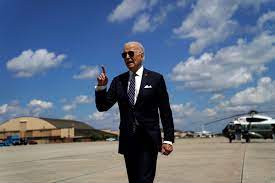
CAMP DAVID, Aug 18, 2023 (BSS/AFP) - US President Joe Biden on Friday will
announce new security cooperation with Japan and South Korea including joint
exercises at a first-of-a-kind three-way summit with their leaders that has
already rattled China.
The summit at the Camp David presidential retreat would have been
unimaginable until recently, with the two treaty-bound allies -- together the
base for some 84,500 US troops -- at loggerheads for decades over the legacy
of Japan's harsh 1910-1945 occupation of the Korean peninsula.
But South Korean President Yoon Suk Yeol, taking political risks at home, has
turned the page by resolving a dispute over wartime forced labor, instead
calling Japan a partner at a time of high tensions with both China and North
Korea.
Biden, Yoon and Japanese Prime Minister Fumio Kishida will agree to a
multiyear plan of regular exercises in all domains, going beyond one-off
drills in response to North Korea, and will announce a "commitment to
consult" during crises, said Jake Sullivan, Biden's national security
advisor.
While the United States already works closely with both allies, the new
initiatives seek for "this three-way cooperation to get deeper and more
institutionalized," Sullivan told reporters at Camp David in the mountains
northwest of Washington.
The leaders will also agree to share real-time data on North Korea and to
hold summits every year, officials said.
Camp David marks the first time the three countries' leaders have met for a
standalone summit, not on the sidelines of larger event, and is the first
diplomatic event since 2015 at the resort, which is synonymous with Middle
East peacemaking.
Sullivan said the summit would have an "affirmative vision" on how the
countries can deliver together and was "not taking aim at a country."
But Rahm Emanuel, the blunt-speaking US ambassador to Japan, took another
tone when he previewed the summit, saying that the three powers "created
something that is exactly what China was hoping would never happen."
China, the former congressman turned ambassador said, should understand: "We
are the rising power; they are declining."
China has flexed its muscle both at home and in Asia under President Xi
Jinping, exerting disputed maritime claims and carrying out major exercises
near Taiwan, the self-ruling democracy claimed by Beijing.
- 'You can never become a Westerner' -
Chinese Foreign Minister Wang Yi urged the two economically developed
Northeast Asian democracies instead to work with Beijing to "revitalize East
Asia."
"No matter how blond you dye your hair or how sharp you shape your nose, you
can never become a European or American, you can never become a Westerner,"
he said in a video shared on official media.
"We must know where our roots lie," he said.
But China's pressure tactics have led to a sharp deterioration in its
favorability in Japan and South Korea, which have traditionally been more
discreet than the United States in their comments.
As of late Thursday, negotiators from the three countries were still debating
whether to refer overtly to China in the final statement, Japanese foreign
ministry spokeswoman Hikariko Ono said.
South Korean intelligence believes Pyongyang is preparing to show its
defiance by test-launching an intercontinental ballistic missile to coincide
with the Camp David summit, Yonhap news agency reported, quoting lawmaker Yoo
Sang-bum.
But the summit hopes to move beyond a focus on North Korea or even just Asia.
Tokyo and Seoul have offered a major boost to Ukraine as major non-Western
powers joining pressure against Russia's invasion.
Secretary of State Antony Blinken said he saw a "new era in trilateral
cooperation."
"Japan and South Korea are core allies -- not just in the region, but around
the world," Blinken said.
- Surprise at public support -
The summit aims to institutionalize three-way cooperation to make it
difficult for any reversal by a future leader -- a South Korean president who
again seizes on hostility with Japan or, potentially, a return of Donald
Trump, who has disparaged US troop commitments overseas as wasteful.
To the surprise of many observers, Yoon's embrace of Japan has drawn
relatively muted protests at home.
Both Japanese and South Koreans feel that there are "a number of
fundamentally aligned values and interests that should bring them together,"
said Mira Rapp-Hooper, senior director for East Asia and Oceania on the
National Security Council.
Yoon, a conservative, has quickly become a close US ally, with Biden
welcoming him for a rare state visit in which the South Korean leader regaled
the audience by singing "American Pie."
Scott Snyder, a Korea expert at the Council on Foreign Relations, said that
domestically Yoon has already paid "the political down-payment" on reaching
out to Japan and could move securely ahead.
But Yoon is constitutionally prohibited from serving more than a single term,
which ends in 2027.
The South Koreans hope to institutionalize the relationship "to hedge against
the risk of reversal in the event that President Yoon is not succeeded by a
like-minded president," Snyder said.